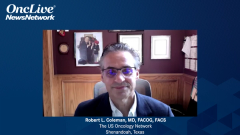
Combining Balstilimab With Zalifrelimab in Patients With Advanced Cervical Cancer
Expert insight on the combination of balstilimab, a PD-1 inhibitor, and zalifrelimab, a CTLA-4 inhibitor, in patients with recurrent or metastatic cervical cancer.
Episodes in this series

Transcript:
Robert L. Coleman, MD, FACOG, FACS: In many other tumor types, we have learned that the combination of inhibition of immune checkpoints and even some activation of agonistic action of other immune checkpoints has led to an optimization of the way that we might be able to evoke the greatest immune response to the presence of cancer and the cancer biology. We’ve learned this from diseases such as melanoma and lung cancer, where a combination of probably the 2 most famous of these immune checkpoints—CTLA-4 and PD-1 and PD-L1 inhibitors in combination—can work in this way synergistically. They act at different components of the immune cell cycle—If you want to use that term—or the immune checkpoint cycle, where there’s antigen presentation and education of the immune system, as well as effector cell therapy, (which is) the local response in the tumor microenvironment.
We have found in these other tumor types that blockade at the point of antigen presentation and at the point of effector cell therapy can induce better and more durable responses to therapy. Because we had seen single-agent activity with PD-1 and PD-L1 inhibitors in cervix cancer, it made a lot of sense to try to adopt the same type of strategy with a combination of other immune checkpoint inhibitors. The most well studied to date is the combination of anti–CTLA-4 as well as anti–PD-1 or anti–PD-L1 combinations. This was adopted in a study on cervix cancer that was recently reported at ESMO [European Society for Medical Oncology Congress 2021].
As we had hoped with the combination trial at ESMO that was reported most recently by Dave O’Malley [,MD, director, Division of Gynecologic Oncology, The Ohio State University Wexner Medical Center], in this cohort of patients who’d been exposed to the combination—a very large cohort of more than 150 patients was ultimately treated—we had increased the objective response rate from around 15% to around 25%. We also saw a very impressive duration of response for these patients. We have been excited to see the activity of these agents from the standpoint of increasing objective response at the clinic level. When we’re talking to a patient and looking for how we can extend their life as long as possible, we’re looking for drug therapies and combinations that will keep the tumor from progressing. Although we talk a lot about objective response, the absence of disease progression is even more important.
What’s really interesting about immune effector cell therapy is that there may be a long-term benefit from education of the immune system, so that active surveillance can be initiated even after patients progress. What we saw in the study was that the progression-free survival for the entire cohort was around what we might expect: about 2.5 to 2.7 months. But the overall survival now exceeded a year, which is quite impressive given the population of patients entering the study and the sample size. This is a pretty mature dataset that’s allowing us to inform our approaches on future trials based on the efficacy of not only the single agent of balstilimab, but now the combination of balstilimab plus zalifrelimab.
Transcript edited for clarity.





































